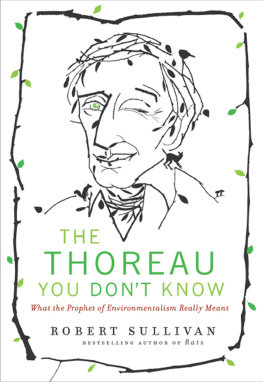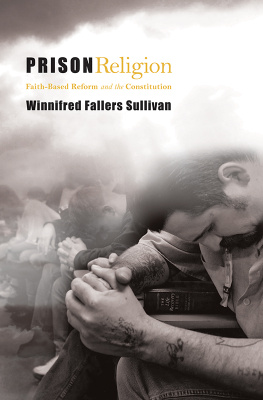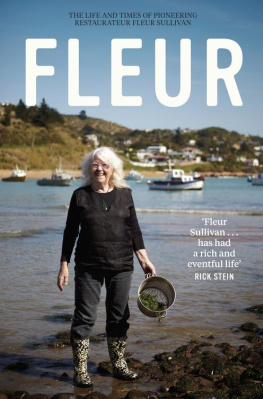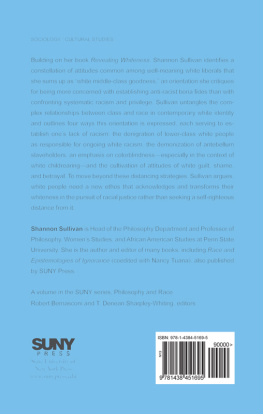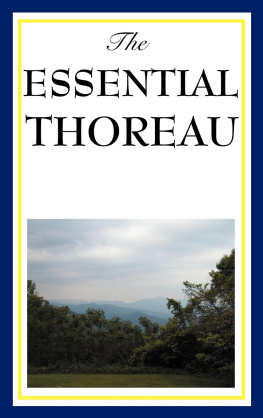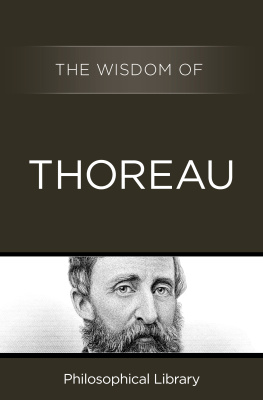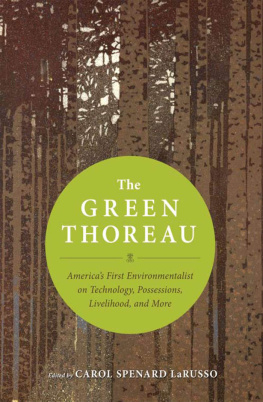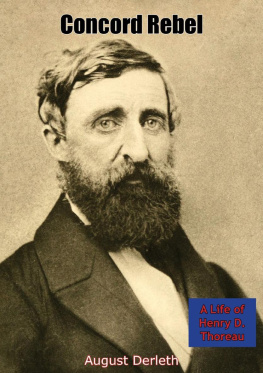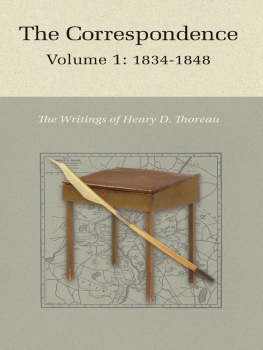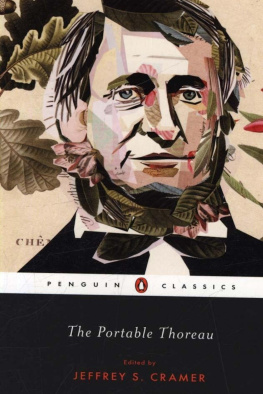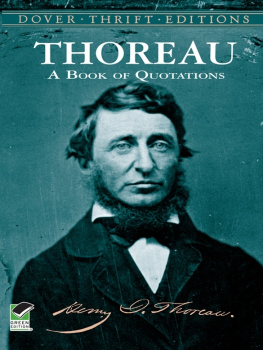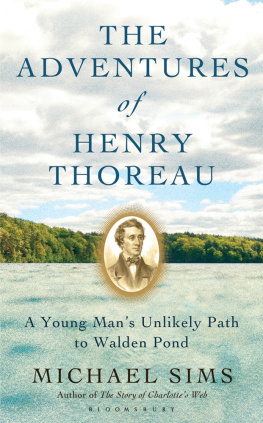THE THOREAU YOU DONT KNOW
ID LIKE TO INTRODUCE the Thoreau you dont know, or dont necessarily know, or know but perhaps never hear people talking about when people talk about Thoreau. People talk a lot about Thoreau in Americathey reference him in these days of ecological awareness, in these green times, in times when, as people all along the political spectrum agree, we care about the earth, the wilderness, whats wild. But when we talk about Thoreau, we talk about a particular Thoreau who I would suggest has more to do with us than Thoreau. The Thoreau we already know is, for instance, not here. Hes out, away, off in the woods most likely, on the shore of that lonely little pond or ascending a faraway mountain. Hes busy getting more in touch with the natural world. Hes not in town with us, thats for sure. The Thoreau we know doesnt really go to town. Hes managed to separate himself from the hustle, the rat raceor at least to say that he has. People wonder, after all. They always have. People dont completely trust this Thoreau. They wonder if hes coming clean, if he really does spend all his time out at the cabin. People wonder if he wasnt cheating somehow, ordering food in or the nineteenth-century equivalent. People wonder especially today, when there is all this pressure on us to be cool to the environment, when there is a lot of pressure to be Thoreau.
Whether or not you buy his story, the Thoreau we know is a secular priest of solitude who lives quietly and alone and, frankly, prefers it that way. That Thoreau livesand this is perhaps the most significant thing about the Thoreau we knowin nature, which is not like the place where the rest of us live. Thoreaus nature is a special, separate place, a place untouched by humans, except, of course, by Thoreau. The mere existence of the Thoreau we know stakes out the boundaries of this extraordinary place in our minds eye, and in the eye of society. That Thoreau lives there makes him inestimably priggish and tiresome, to quote a cultural critic. And yet as much as we chide him for being there, we dont necessarily want Thoreau to come home from the woods. Our relationship with him is symbiotic; the Thoreau we know, as difficult as he can be to deal with, helps us to live our daily not-so-strict lives, our less-intentioned existence. Its good to know the idea of him is still alive, that he is off in that special place, even if we dont spend much time in nature ourselves or havent seen it since our last vacation, since we took a break from our personal everyday.
The Thoreau we know is a man of principle, steady, unbending, even when he applies himself to issues that, frankly, dont seem to have anything to do with nature or the environment, such as war. Indeed, he is the man who went to jail for his principles, who was carted off to prison for not paying taxes because he did not believe in an American military campaign, because he thought our war against Mexico was illegal, which it was. It might be argued, in fact, that we rely on his moral fibercount on it, evento live the lives we live. As citizens of everyday life, we maintain a measured and sensible flexibility, as opposed to Henry David Thoreau. We live in the real world, as opposed to a cabin off in the woods; in the real world, things happen, people have to be places, bills have to be paid, and eggs have to be broken. In a way, his intransigence allows for our flexibility. We can, in good or at least better conscience, bend in the winds of everyday practicality, precisely because of the trunk-like rigidity of Thoreau, the single-minded nature boy. He holds the environment sacrosanct. Indeed, he is the father of environmentalism, as Edward O. Wilson, the scientist and naturalist, has called him. He worships nature, monk-like, while we carry on at home, ministering to the demands of the nonnatural world. He tends the pure garden of Mother Earth, to be poetic about it, while we trudge through the fields of the mundane. Theres even a hint of jealousy: while he gets to live in a cabin in the woods, we stay at home and go to work. We have to make a living. Though when our lives permit, we eventually turn and appreciate what he has done, who Thoreau is, and what we know he stands for (whether we have read a lot of his work or not). We behold the pure majesty of nature, we camp or hike or hotel in all its glory, then we get back into the car and go home.
B UT HERES ANOTHER T HOREAU . Heres a Thoreau who lives in town, in the center city of Concord, which, while not quite the size of a city, even though it wants to be, is a large town. Here is the Thoreau who is born in town and, except for a few trips to the Maine and Massachusetts coast, except for a little less than a year in New York City, lives his entire life in his town. This Thoreau is a local yokel, playing in the woods as a kid, getting to know all the old farmers as he gets older. He goes to college in Cambridge, Massachusetts, a long walk, and then a few years later, a short train trip, away. While a student, he lives with a social reformer in a factory, one of the most radical reformers in America. He comes back to his hometown to discover that there are no jobs, a recession. He goes on the road, to Maine, and he cant find any jobs there either. Thoreau also returns to discover that Ralph Waldo Emersonthe most exciting intellectual and the most renowned intellectual reformer in Americais a neighbor, a neighbor whose sister lives at the Thoreau home. (To survive the recession, Thoreaus mother takes on boarders.)
Emerson and Thoreau hit it off, Transcendental mentor and pupil. They are friends in matters lofty (poetry, theology, critique of America) and in matters more mundaneEmerson likes to go on walks in the woods, and Thoreau, having grown up there, knows all the places and even has a boat, until he sells it, in need of cash. Thoreau moves to Emersons house, takes care of Emersons children, his carpentry, his yard work, his gardening, all the while doing other chores for other people around the village, the Transcendental handyman. Thoreau tries poetry, then essay writing, then edits the Transcendentalists magazine, the Dial . In none of these endeavors does he manage to make much in the way of money. He next tries his hand at a genre of writing that is becoming known as nature writing, and manages to achieve some commercial success, though Emerson is not as impressed with Thoreaus writing as Thoreau is. He moves to New York, tries to establish himself as a successful free-lance writer, but gets homesick and returns early to Concord.
When he comes home, he decides to build himself a little house on the pond on the edge of town, about forty New York City blocks from the village center on a woodlot owned by Emersona woodlot that is not so much woods, in the sense that we think of woods today, as it is a place where Emerson cuts the trees that each day heat his house as he writes away. When Thoreaus friends visit, when his neighbors and family come to the pond for picnics or to stop by for the watermelon party that Thoreau throws every year (which he inaugurated before his time at Walden and would continue after his time there), Thoreau is sometimes excited, sometimes in the middle of work, cranking out several essays and two books in two years. He put a chair out on the porch to let them know he was looking for company. The first book he writes at Walden, A Week on the Concord and Merrimack Rivers, is a failure, and it begins a rift in Thoreau and Emersons mentor-mentee relationshipa rift that would affect the relationship between the two friends, and that would ultimately taint Americas relationship with Thoreau and, I would argue, with its idea of nature.

